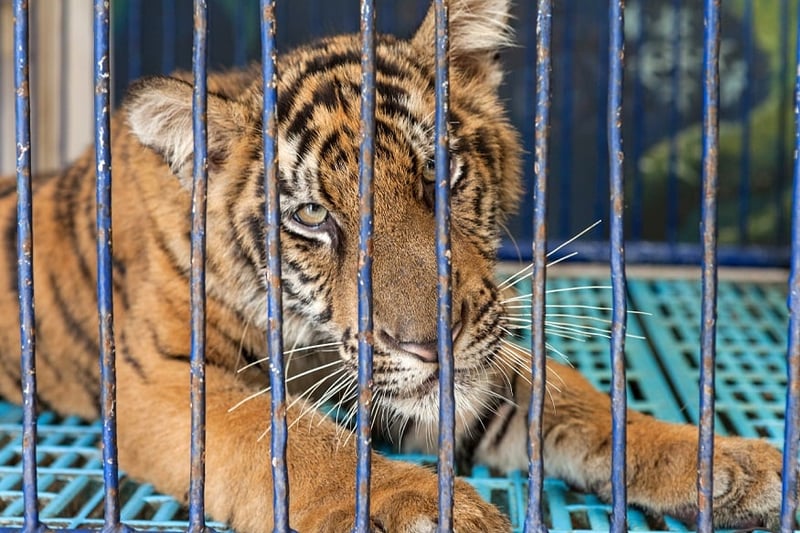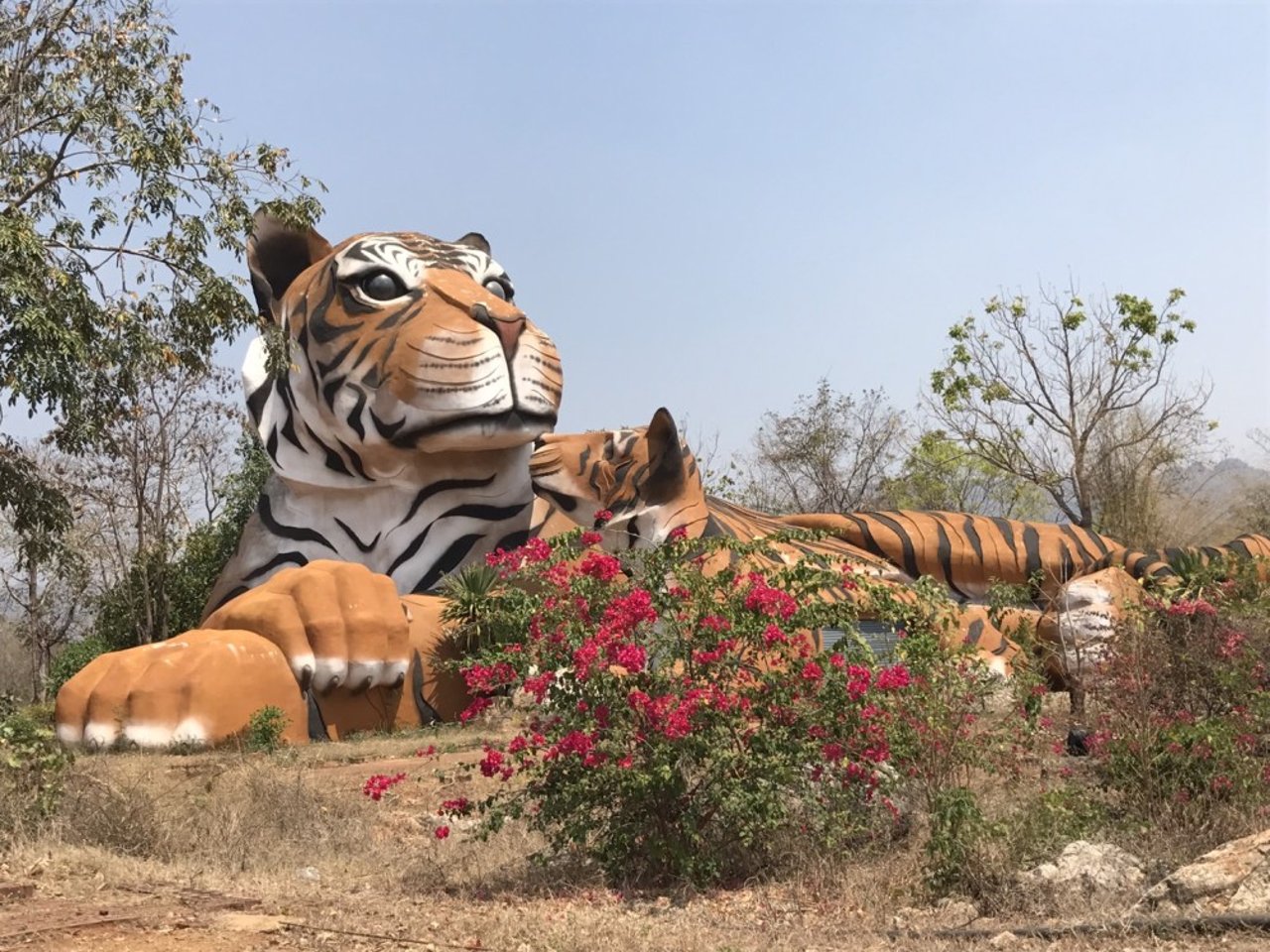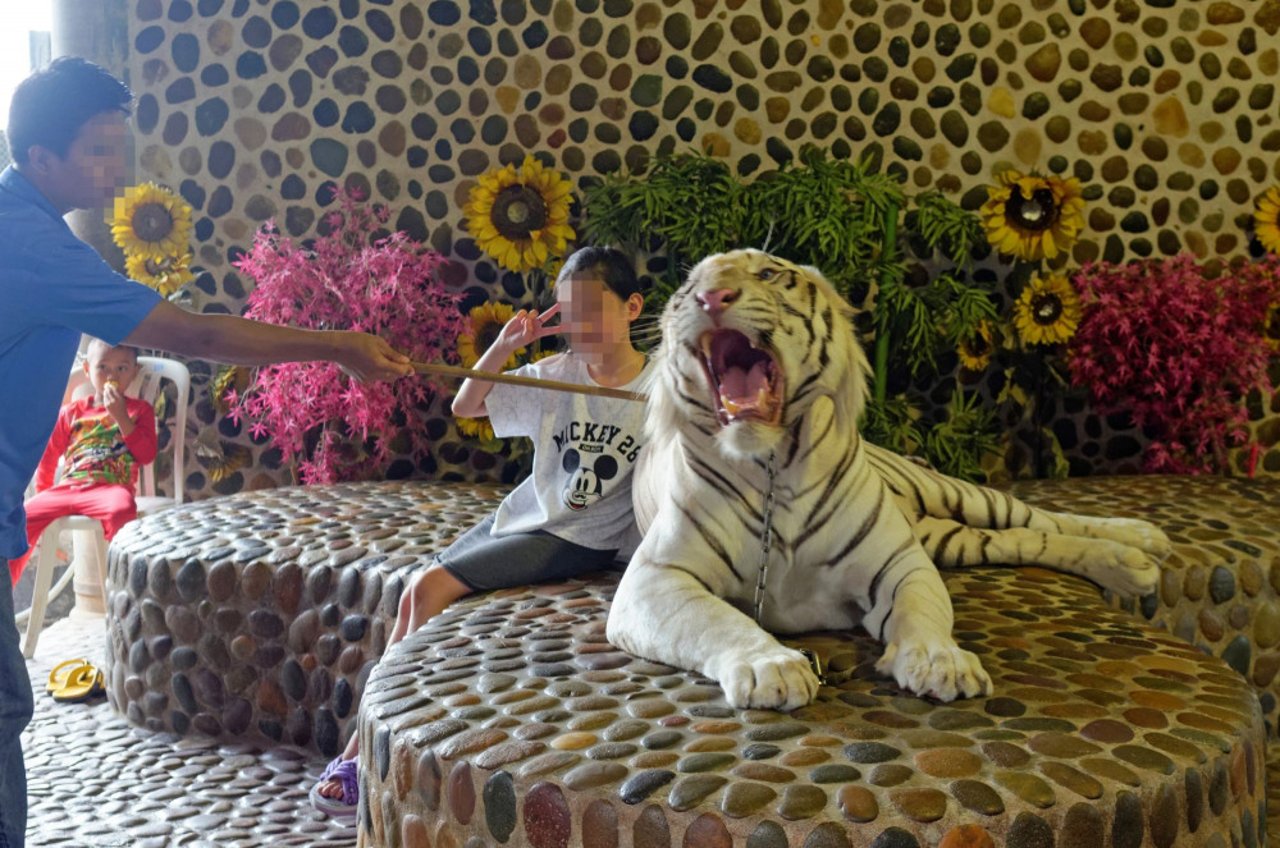
Fear for tigers, as company behind cruel Tiger Temple plans to open a new venue
News
The business behind the Tiger Temple tourist venue in Thailand, shut down after police made horrifying finds including the bodies of cubs, and tiger skins and teeth, is trying to open a new attraction. We must stop this
Our recent investigation has uncovered the shocking news that the company behind Thailand’s controversial Tiger Temple has changed its name to Golden Tiger (Thailand) Co. Ltd. and is planning to open a new tiger entertainment attraction.
Construction has already started at the new site in Kanchanaburi in the west of Thailand.
Given the appalling conditions at the former Tiger Temple, which ultimately led to its closure, we’re urging the Thai government not to activate the full zoo license needed for another tiger entertainment venue to be opened.
A large model tiger at the old Tiger Temple site, Kanchanaburi Province, Thailand
Provisional license
The Golden Tiger (Thailand) Co Ltd already has a provisional license for this new business venture, transferred over from Tiger Temple Co Ltd..
Our fear is that a full zoo licence will be issued if the company is deemed to meet 11 specified conditions within six months.
These include the provision of enclosures considered large enough for the tigers and vet care. Worryingly, these conditions fail to ban breeding or cruel tourist interactions with tigers at the proposed new venue.
A tourist has their photo taken with a tiger at a wildlife tourist attraction in Thailand
Our colleagues in Thailand are in constant contact with Thailand’s Department of National Parks (DNP) and have already submitted two formal requests not to issue the license and to impose a breeding ban.
Shocking discoveries
Tiger Temple, once a well-known tourist attraction because of its large collection of tigers, was recorded to have at least 147 tigers in 2016.
Following years of allegations of illegal breeding and trafficking of tigers and their parts, more than 500 officers from the DNP raided the venue in May last year. They found dozens of dead cubs in freezers alongside tiger skins, amulets and tiger teeth trinkets. Around 147 live tigers were confiscated, and are still under the care of DNP.
Ongoing investigations
Official investigations into the illegal wildlife trade allegations against Tiger Temple are ongoing. We are deeply worried that the granting of a full zoo license may put tigers at risk again.
Last year, we delivered a petition to the DNP calling for a thorough investigation into all captive tiger facilities in Thailand. The 32,000 signature-strong petition also urged the Thai authorities to ban the breeding of tigers at commercial venues which serve no conservation benefit for tigers in the wild.
Extreme suffering
Dr. Jan Schmidt-Burbach, our senior wildlife and veterinary advisor, said:
"Tiger farms have nothing to do with conservation – it just brings extreme suffering to these wild animals whilst living in appalling conditions.
"These venues need to be stopped in their tracks because they clearly have links to the dark side of wildlife trafficking rings."
A lifetime of suffering
Last year, we released a study Tiger selfies exposed, on tigers used for entertainment in Thailand. The report documented a 33% increase in the number of tigers at tourism facilities over a five-year period.
The main welfare concerns witnessed by the investigators at the tourist venues in the report included:
- tiger cubs being cruelly separated from their mothers two to three weeks after they are born
- young cubs used as photo props with tourists; constantly viewed and mishandled hundreds of times a day, which can lead to stress and injury
- tigers being punished to stop aggressive unwanted behavior
- the housing of most tigers in small concrete cages or barren enclosures with limited access to fresh water
- behavioral problems, which one in ten (12%) of the tigers we observed. Problems include repetitive pacing and tail-biting.
Dr. Schmidt-Burbach added: "Tourists need to be aware that their once in a lifetime opportunity to get up close to a tiger causes a lifetime of suffering. A selfie with a tiger is cruel, so don’t do it."
Wild animals are not entertainers
Every day, hundreds of thousands of wild animals suffer in the name of entertainment.
Tourists are often unaware of the abuse that tigers and other animals at tourist attractions face behind the scenes.
To make them safe to handle, cubs are removed from their mothers at an early age. Conditions are harsh, with tigers often kept on leads, or in small, barren cages. They are punished or beaten to train them and keep them under control.
A better way
Our 2014 independent global poll, showed that 93% of tourists take part in wildlife tourism because they love wild animals, or do so to have fun. Of these same tourists, 83% said they would prefer to see wild animals in the wild if they had the chance.
If you can ride, hug, or have a selfie with the wild animal, the chances are it’s a cruel venue. Don’t go.
These venues need to be stopped in their tracks because they clearly have links to the dark side of wildlife trafficking rings. - Dr. Jan Schmidt-Burbach, our senior wildlife advisor

